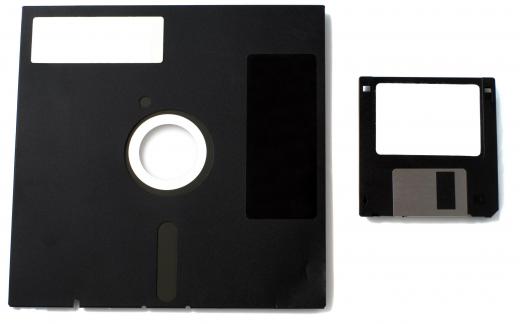At EasyTechJunkie, we're committed to delivering accurate, trustworthy information. Our expert-authored content is rigorously fact-checked and sourced from credible authorities. Discover how we uphold the highest standards in providing you with reliable knowledge.
What is File Sharing?
File sharing, in Internet terminology, is a means of exchanging files between computers over the Internet. The term “file sharing” can also refer to disk sharing or server sharing between computers on a closed network. Since the advent of high-speed Internet, however, it typically refers to the practice of sharing files with a potentially limitless number of worldwide Internet users. File sharing is often criticized as a means of facilitating copyright infringement, as many of the files shared—particularly music and film files—are protected by copyrights in at least one country.
Ever since people have been using computers, they have been sharing files and moving data from one computer to the next. Early on, floppy disks were the only way to share data and files. Before long, however, computers were able to network with each other, and rudimentary chat programs, including Internet relay chat, became common ways of sharing material.

The birth of dial-up Internet brought with it instant messaging and e-mail capabilities. Instant messages and e-mail proved useful for conversation, but also provided a means of rudimentary file transfers. The first attachments were very limited in size, and in the beginning, little more than a single-page document could be exchanged.
As the capacity and speed of the Internet grew, so did the sharing capability of supported programs. In many ways, the rise of file sharing grew from user demand: computer users wanted to share certain files, and so engineered ways to make that sharing happen. The demand side of the technology is perhaps best seen with respect to digital music.

In the late 1990s, technology developed for digitizing music that allowed it to be transferred, or rewritten, from CDs to personal computer hard drives. The ability to save and effectively copy music from a purchased CD was, and remains, controversial. The practice persisted primarily on the argument that once a consumer purchases music, he should have the right to listen to and use that music however he chooses.

It was not long before music files began being shared between users. The first file sharing websites used a technology known as “peer-to-peer,” or P2P, file sharing. P2P programs make each user’s entire music library available to other users for download. P2P users can search for and download music in vast quantities in an objectively short period of time.
A similar technology, BitTorrent, soon followed. BitTorrent is an open source file sharing application that allows users to isolate a desired file on a shared network, then download it in pieces from several different users. Whereas P2P software downloads a desired file from a single user, BitTorrent software downloads a piece of the file from many users, then assembles all of those pieces into the desired whole on the user’s computer. Both platforms work best with a wide swath of users.
Copyright owners, particularly those situated in the United States, have long opposed music file sharing, calling it a means of facilitating mass copyright infringement. While a person who purchases a CD may have a right to make a copy for personal use, the right does not extend to making that copy freely available for others to download online. Copyright owners and their representatives have launched many lawsuits seeking to shut down websites that use P2P and other similar methods of file sharing. Rights owners have also sued individual downloaders for copyright infringement, particularly on U.S. college campuses.
Recognizing that the demand for easily downloadable, free music is unlikely to disappear, copyright owners and music industry representatives have tried to create music download services that strike a happy medium between user demands and owner rights. Many of these services mimic the file sharing experience, but incorporate either nominal fees or some sort of rights protection mechanisms to prevent infringement. Some of these services have proved popular. As of 2010, however, music file sharing websites still persist, though most are based outside of the United States.
AS FEATURED ON:
AS FEATURED ON:













Discussion Comments
@Melonlity -- a major difference between the old forms of copyright infringement and file sharing is the technology used. Let's face it -- anyone with an Internet connection and a little computer savvy can download virtually any album or movie that he or she wants.
In the old days, record companies knew that people were copying albums and giving them to their friends. However, the extent of that piracy is completely unlike what can be done now. You might have copied that Thompson Twins LP to cassette and delivered it to a friend, but that's nothing like ripping a Thompson Twins CD to MP3 files, the songs on a torrent site and potentially sharing it with millions of people. Piracy on that scale is what worries the entertainment industry.
One fascinating wrinkle to this whole discussion is that copying and illegally sharing copyrighted material is nothing new. People used to do it by copying albums and cassettes to blank tapes and giving them to friends. The same thing could be said of video tape -- it was very common to rent a movie, copy it to a blank and keep it. Heck, people used to photocopy books.
Post your comments